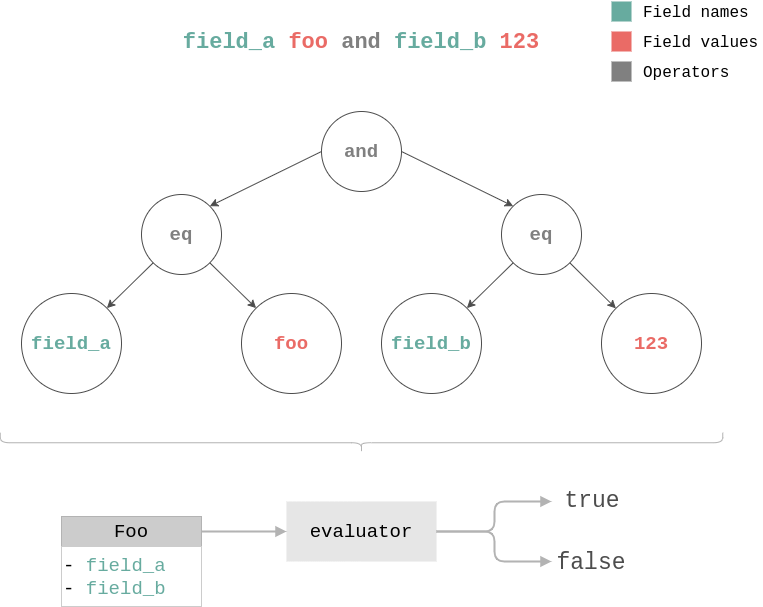The library is under development and subject to change. Contributions are welcome. You can also log an issue if you have a wish for enhancement or if you spot a bug.
booleval is a small C++17 library for evaluating logical expressions. It implements recursive descent parser mechanism for building an expression tree for a user-defined logical expression. After the expression tree is being built, map of fields and values representing a certain object can be passed to the evaluator component of this library which will evaluate those values to true or false according to the user-defined logical expression.
In programming languages like Java and C# accessing arbitrary fields inside a class represents an omnipresent problem. However, it got solved by introducing a reflections feature. This feature provides us information about the class to which a certain object belongs to and, also, the methods of that class which we can invoke at runtime.
Since the reflection feature is missing in C++, booleval library is implemented. It checks whether the members of a class to which an object belongs to have certain values. Members of a class are specified in a string format and can be used to form a logical expression.
Providing an end-user a functionality of specifying a logical expression is a common way of filtering out a large amounts of objects. E.g. tcpdump and BPF (Berkeley Packet Filter), network tools available on most UNIX-like operating systems, have pretty much the same syntax for their filter expression.
EQUAL TO operator is an optional operator. Therefore, logical expression that checks whether a field with the name field_a has a value of foo can be constructed in a two different ways:
- EQUAL TO operator is specified in the expression:
field_a eq foo - EQUAL TO operator is not specified in the expression:
field_a foo
To conclude, equality operator is a default operator between two fields. Thus, it does not need to be specified in the logical expression.
(field_a foo and field_b bar) or field_a bar(field_a eq foo and field_b eq bar) or field_a eq bar
(field_a foo and field_b barNote: Missing closing parenthesesfield_a foo barNote: Two field values in a row
| Name | Keyword | Symbol |
|---|---|---|
| AND operator | AND / and | && |
| OR operator | OR / or | | | |
| EQUAL TO operator | EQ / eq | == |
| NOT EQUAL TO operator | NEQ / neq | != |
| GREATER THAN operator | GT / gt | > |
| LESS THAN operator | LT / lt | < |
| GREATER THAN OR EQUAL TO operator | GEQ / geq | >= |
| LESS THAN OR EQUAL TO operator | LEQ / leq | <= |
| LEFT parentheses | ∅ | ( |
| RIGHT parentheses | ∅ | ) |
booleval project requires C++17 compiler and has been tested on:
- gcc 8.4.0
- clang 7.0.0
- msvc 19.16
There are no 3rd party dependencies.
In order to compile the library, run the following commands:
$ # create the build directory
$ mkdir build
$ cd build
$ # configure the project
$ cmake ../
$ # compile
$ makeIn order to run unit tests, run the following commands:
$ # fetch the googletest submodule, needed for tests
$ git submodule init
$ git submodule update
$ mkdir build
$ cd build
$ # configure the project
$ cmake ..
$ # compile tests
$ make tests
$ # run tests
$ make testIf you find that any tests fail, please create a ticket in the issue tracker indicating the following information:
- platform
- architecture
- library version
- minimal reproducible example
Let's say we have a large number of objects coming through our interface. Objects can be of the following class obj type:
struct obj {
std::string field_a_;
uint32_t field_b_;
public:
obj(std::string const& field_a, uint32_t const field_b)
: field_a_(field_a),
field_b_(field_b)
{}
std::string const& field_a() {
return field_a_;
}
uint32_t field_b() {
return field_b_;
}
};In our application, we want to let end-users to specify some sort of a rule which will filter out only those objects that contain certain field values. This rule can have a form of a following logical expression field_a foo and field_b 123. Now, we can use booleval::evaluator component to check whether objects conform specified rule.
#include <string>
#include <iostream>
#include <booleval/evaluator.hpp>
int main() {
obj pass("foo", 123);
obj fail("bar", 456);
booleval::evaluator evaluator({
{ "field_a", &obj::field_a },
{ "field_b", &obj::field_b }
});
auto valid = evaluator.expression("field_a foo and field_b 123");
if (!valid) {
std::cerr << "Expression not valid!" << std::endl;
}
if (evaluator.is_activated()) {
std::cout << std::boolalpha << evaluator.evaluate(pass) << std::endl; // output: true
std::cout << std::boolalpha << evaluator.evaluate(fail) << std::endl; // output: false
} else {
std::cerr << "Evaluator is not activated!" << std::endl;
}
return 0;
}


